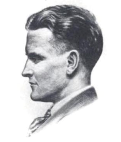The Great Gatsby by F. Scott Fitzgerald
Page 4 of 25 - 1 2 3 4 5 6 7 8 9 10 11 12 13 14 15 16 17 18 19 20 21 22 23 24 25 Purchase full notes for £6.95 (aprox $10.84)
Indeed, it is via his seemingly endless maze of ambiguities, that Fitzgerald feeds his characters’ constant itch to scrutinize and assess Gatsby himself, something Jordan immediately recognises in Nick: ‘Now you ’re started on the subject’ she tells him ‘with a wan smile’ (55). The contradictions of such fallible human judgements, however, are there from the very first pages of the novel. They are even present, to an extent, in the book’s title. It could reasonably be assumed, for example, that Nick regards Gatsby as ‘great’ because he has chosen ‘The Great Gatsby’ as the title for his novel. However, in the book’s opening pages his assessment is much more nuanced than this: ‘Gatsby turned out all right in the end’ (8), he says, despite the fact that he ‘represented everything for which’ he (Nick) has ‘an unaffected scorn’ ( ibid .). Perhaps Nick has seen something ‘great’ in Gatsby beyond what he ‘represented’. However, the overall initial impression the reader takes away is of a complex, compromised and inexact judgement, a judgement, in fact, not dissimilar to human beings’ real judgements of real people, particularly with regard to those for whom they feel an emotional bond. Taken in this context, the title ‘The Great Gatsby’ is immediately tinged with a degree of irony (‘turning out all right in the end’ being hardly an obvious indication of true greatness ), and for most readers the meaning of the title will continue to shift up and down a kind of sliding scale of ironic discourse depending on which chapter of the text they are reading. This is obviously a subjective matter, but it is hard to imagine any readers arguing for the semantic certainty of straightforward denotation in the title on the one hand, or the crystal clear reversal of meaning associated with direct sarcasm on the other.
It is interesting that all the novel’s major characters move from an imagined clarity in the past to a degree of rather messy ambiguity in the novel’s present. All are, as Nick points out on page 183, ‘Westerners’ – and all of them move, geographically and morally, from the fixed certainties of the Middle West to the strange and glamorous ‘orient’ of the East Coast. The latter is epitomised by Gatsby of course; the former by Nick’s father who steadfastly assumes that his son’s background gives him certain unassailable ‘advantages’ over the rest of the human race (7), a point of view, interestingly, that Nick does little or nothing to distance himself from. When Nick returns to his home country – finally sick to death of East Coast ‘ambiguity’ – he paints for the reader a picture-postcard idyll set forever in the Christmas snow of childhood purity – ‘real snow, our snow’ (182) – in which white is white, and blue is, presumably, always blue.

